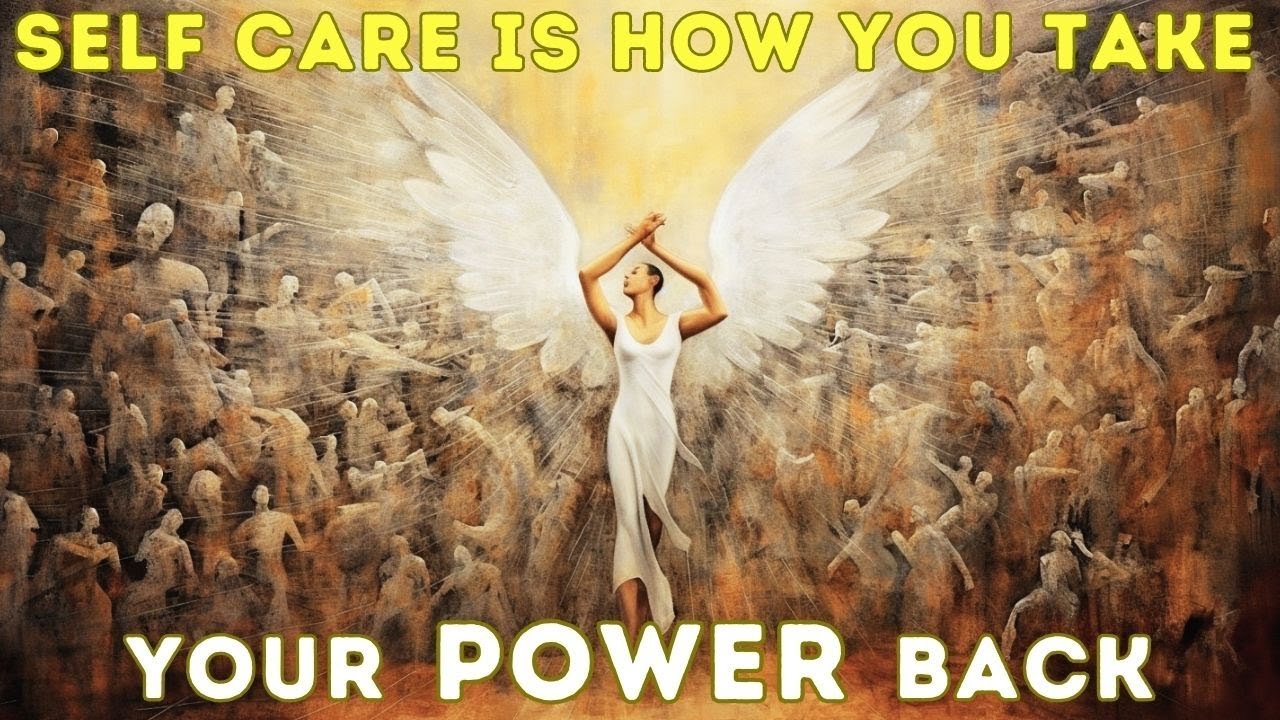In a world that often emphasizes selflessness, the concept of embracing self-centeredness to achieve true freedom is both intriguing and transformative. This article explores a new perspective on selfishness, challenging traditional notions by suggesting that placing importance on personal needs can foster genuine altruism. By aligning with your inner guidance and emotions, and recognizing the balance between self-care and caring for others, you open doors to authentic personal growth and liberation.
Drawing on Friedrich Nietzsche’s idea of power as a pathway to liberation, the discussion emphasizes personal growth and self-expansion. The exploration encourages you to redefine success by focusing on aligning with your true self, rather than chasing external validation or material wealth. By prioritizing self-reflection and understanding, you can break free from limiting patterns and find deeper compassion for yourself. This journey towards self-centeredness is about nurturing your inner power to ultimately live a fulfilling and authentic life.

This image is property of i.ytimg.com.
Understanding the Paradox of Liberation
The concept of liberation through self-centeredness presents a fascinating paradox. In a world that often equates self-centered behavior with selfishness, the idea that focusing on oneself can lead to genuine freedom seems counterintuitive. Yet, this approach suggests that by nurturing your own needs and desires, you may unlock a more profound understanding of yourself and, in turn, develop a greater capacity for empathy and selflessness. Embracing this paradox requires challenging the conventional wisdom that views self-centeredness in a negative light and exploring how it can be a catalyst for personal growth and authentic living.
Defining Liberation and Self-Centeredness
Liberation, in its truest sense, means freeing oneself from the constraints of societal expectations and the pressures imposed by external forces. It implies a journey towards personal authenticity and self-determination. On the other hand, self-centeredness is often misunderstood as purely ego-driven behavior. However, viewed through a different lens, it can mean being in tune with one’s needs and desires, aligning oneself with inner truths, and recognizing personal value and worth. It’s about embracing who you are without the constant need for external validation, thereby fostering a sense of liberation from societal expectations and norms.
Exploring the Relationship Between Freedom and Self-Focus
The relationship between freedom and self-focus lies in the understanding that true personal liberation comes from aligning with one’s inner values and desires. By focusing on your own needs and growth, you empower yourself to live authentically and with purpose. This self-focus does not negate the importance of others; instead, it creates a solid foundation from which you can engage with the world more genuinely. When you are in harmony with yourself, you can offer more to others, as your actions are not driven by obligation but by genuine care and connection.
The Fine Line Between Selfishness and Self-Care
The concepts of selfishness and self-care often occupy the same semantic space but are distinct in their implications and outcomes. Distinguishing between them is crucial for understanding how self-centeredness can contribute to liberation and personal growth.
Distinguishing Selfishness from Healthy Self-Care
Selfishness is often characterized by an excessive focus on one’s desires to the detriment of others’ well-being. In contrast, healthy self-care involves nurturing oneself to maintain one’s mental, physical, and emotional health. It’s vital to recognize that attending to your own needs does not mean neglecting others; instead, it acknowledges that you are better equipped to support those around you when you are well-supported yourself. Healthy self-care is about balance—prioritizing your needs without compromising the well-being of others.
Embracing Self-Centeredness for Future Selflessness
By embracing moments of self-centeredness, you create the potential for greater selflessness in the future. This approach allows you to recharge, cultivate empathy, and foster a deeper connection with others. When you understand and meet your own needs, you create an inner resourcefulness that enables you to be more present and supportive of others. Thus, self-centeredness becomes a tool for sustainable altruism, helping you to give freely and genuinely because you have first filled your own cup.
Challenging Conventional Views of Selfishness
The prevalent view of selfishness is often negative, equating self-focus with a lack of empathy or concern for others. However, reevaluating this perspective can reveal the necessity of prioritizing personal needs as a foundational element for genuine contribution to the greater community.
The Necessity of Prioritizing Personal Needs
Prioritizing your own needs is not about excluding or disadvantaging others. It is about recognizing that your well-being is essential to your ability to contribute meaningfully to the lives of those around you. By attending to your emotional, psychological, and physical needs, you enhance your capacity for empathy and understanding. This holistic approach creates a stronger version of yourself, capable of handling more, offering more, and being more present for others.
Building a Foundation for Altruism Through Self-Focus
Focusing on the self is an integral part of building a foundation for altruism. When you are aware of your needs and actively seek fulfillment, you are developing the emotional and psychological resources necessary for empathic and altruistic behaviors. Altruism born from a place of strength and self-awareness is more sustainable and impactful, as it is driven by genuine desire rather than obligation or depletion.
Nietzsche’s Concept of Power and Individual Liberation
Nietzsche’s philosophical ideas about power and liberation offer valuable insights into the journey of personal growth and the pursuit of freedom. He encourages the understanding of power not as domination over others, but as a personal form of energy that promotes individual growth and self-expansion.
Power as a Means of Personal Growth
For Nietzsche, power is not about exerting dominance over others but about increasing one’s own capabilities and potential. It’s about self-improvement and personal development, leading to a stronger, more authentic self. This power comes from setting meaningful goals and overcoming personal barriers. In this context, power is a catalyst for personal growth and liberation, as it allows individuals to transcend their limitations and explore their fullest potential.
Self-Expansion vs. Controlling Others
The distinction Nietzsche makes between self-expansion and controlling others is crucial. True power, according to Nietzsche, lies in self-expansion and personal growth. It’s about enhancing your skills, capabilities, and understanding of the world around you, independent of others. The pursuit of power as control over others is seen as a misstep—a sign of weakness rather than strength. Genuine liberation, therefore, is rooted in self-expansion, which empowers individuals to break free from societal constraints and live authentically.

Aligning with Inner Guidance and Emotions
Connecting with your inner guidance and emotions is essential for achieving authenticity and personal fulfillment. This internal alignment is crucial for navigating life’s challenges and realizing genuine freedom.
The Role of Inner Guidance in Achieving Authenticity
Inner guidance acts as a compass, directing you toward your true self and genuine desires. By tuning into your internal signals, you gain clarity about what aligns with your values and what does not. This awareness is fundamental in making decisions that are true to yourself, fostering a life of authenticity and fulfillment. Listening to your inner guidance helps circumvent the noise of external expectations, paving the way to a more liberated and genuine existence.
The Importance of Being In Tune with One’s Emotions
Being in touch with your emotions is a key component of personal alignment. Emotions provide essential feedback about your inner state, indicating whether you are on the path that resonates with your true self. By recognizing and honoring these emotions, you can better manage your life experiences and maintain a state of personal and emotional balance. This emotional intelligence acts as a pillar for understanding oneself and making decisions that enhance your personal freedom and authenticity.
Achieving Genuine Freedom Through Personal Alignment
Personal alignment is the pathway to genuine freedom, as it involves connecting with your source energy and rejecting the pressures of external validation. By focusing on internal fulfillment, you unlock the door to true happiness and liberation.
Understanding Source Energy and Personal Fulfillment
Source energy represents the essence of who you are, your fundamental life force. By aligning with this energy, you connect with your deepest desires and values, creating a sense of wholeness and fulfillment. This alignment is crucial for living a life that reflects your true self and enables genuine freedom. Understanding and nurturing this connection eliminates the need for external validation, allowing you to live authentically and with purpose.
Rejecting External Validation and Expectations
To achieve genuine freedom, it is imperative to reject the overwhelming societal expectations and the constant search for external validation. True happiness and self-worth come from accepting yourself as you are, not from the approval or opinions of others. By embracing this perspective, you cultivate an inner strength that fosters self-liberation, allowing you to live life on your own terms.

The Importance of Balance in Personal Growth
Personal growth is a journey that necessitates balance, embracing both joy and sorrow as transformative elements. By striking this balance, you cultivate resilience and authenticity in your life.
Accepting Joy and Sorrow as Transformation Elements
Joy and sorrow are integral components of personal transformation. Rather than avoiding negative emotions or chasing positivity at all costs, it is important to appreciate the insights and growth potential that arise from both. Embracing this duality allows for a more enriched life experience, where each emotion is seen as part of the broader tapestry that contributes to personal evolution and resilience.
Strategies for Balancing Life’s Contrasting Emotions
Balancing life’s emotions requires mindfulness and intentional strategies. Practices such as meditation, self-reflection, and gratitude can help maintain equilibrium amidst emotional fluctuations. Being conscious of your emotional states and employing techniques to process them constructively supports a healthy mental and emotional life. This balance nurtures personal growth and the ability to navigate life’s complexities with grace and composure.
The Role of Self-Inquiry and Introspection
Self-inquiry and introspection are powerful tools for breaking free from limiting beliefs and patterns. They encourage a deeper understanding and compassion towards oneself, promoting growth and liberation.
Breaking Free from Limiting Patterns
Identifying and releasing limiting patterns is essential for personal liberation. Self-inquiry allows you to observe repetitive behaviors and beliefs objectively, questioning their validity and impact on your life. This critical examination empowers you to make conscious changes, freeing yourself from constraints that no longer serve you and fostering a more empowered and liberated self.
Fostering Compassion and Understanding for Oneself
Compassion towards oneself is critical in personal evolution. By approaching your imperfections and challenges with kindness, you create a safe space for growth and transformation. This self-compassion nurtures resilience and promotes a positive self-image, essential components for moving beyond self-imposed limitations and embracing your true potential.
Redefining Success by Aligning with True Self
True success transcends material wealth and is defined by alignment with your true self. This understanding emphasizes the pursuit of inner well-being as the cornerstone of a fulfilling life.
The Pursuit of Inner Well-Being Over Material Wealth
The pursuit of inner well-being prioritizes personal happiness, fulfillment, and authenticity over material accumulation. While material wealth may provide temporary satisfaction, true contentment comes from living in accordance with your values and desires. This shift in focus allows for a more meaningful and enriched life experience.
True Success through Authentic Self-Alignment
Authentic self-alignment is the bedrock of true success. By living in harmony with your true self, you experience a sense of fulfillment and happiness that is not dependent on external circumstances. This alignment empowers you to create a life that reflects your highest values and contributes to your overall sense of purpose and well-being.
Conclusion
Recapping the Paradox of Liberation Through Self-Centeredness
The paradox of liberation through self-centeredness emphasizes the role of self-focus in achieving genuine freedom. By nurturing personal needs and desires, you cultivate a more profound self-understanding, leading to authentic living and a greater capacity for empathy and altruism.
Encouraging a Balanced Approach to Personal Growth and Altruism
A balanced approach to personal growth incorporates both self-care and selflessness. By embracing the value of personal well-being and aligning with your true self, you lay the groundwork for a more empathetic and altruistic life, fostering both personal and societal well-being.

